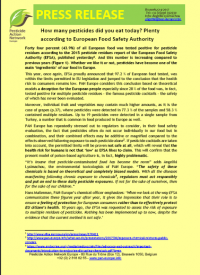Press releases
Today, on the occasion of the international press conference in Paris hosted by Senator Joël Labbé marking the unanimous adoption of the European resolution to ban non-agricultural pesticides across Europe[1] by the French Senate, Pesticide Action Network (PAN) Europe and Générations Futures warmly welcome the resolution and call on the Parliaments of other EU Member States to adopt similar resolutions.
Today, the Agriculture Committee (COMAGRI) has voted in favour of the resolution against the ban of pesticides in ecological focus areas (EFAs). PAN Europe finds the vote outrageous and shameful which completely ignores the overall purpose of EFAs which is to bring benefits for the environment and, safeguard and improve biodiversity on farms.
The Commission has produced a Staff Working Document on Water and Agriculture (SWD(2017)153 final) which it will present in the informal meeting of Agriculture Ministers in Malta on the 23rd of May. The working document is the outcome of a collaboration between the environment department and the agriculture department of the Commission on the matter.
Some key extracts of the document include:
Extracts from the Staff Working Document SWD (2017) 153 final:
Pesticide Action Network (PAN) Europe, Inter-Environnement Wallonie and the Velt welcome the proposal of Agriculture Minister Mr Borsus to ban placing of glyphosate-based herbicides on the market for non-professional users by the end of 2017 and restrict their use in private gardens.
Forty-four percent (43.9%) of all European food was tested positive for pesticide residues according to the 2015 pesticide residues report of the European Food Safety Authority (EFSA), published yesterday[1]. And this number is increasing compared to previous years (Figure 1). Whether we like it or not, pesticides have become one of the main ‘ingredients’ of our food in Europe.
In February 2016 EU Ombudsman ruled that the European Commission health service DG SANTE violated the precautionary principle by approving pesticides with serious data gaps and high risks. Data gaps observed by Food Authority EFSA and high risks should have made it impossible for DG SANTE to conclude that harmful effects to humans are absent as well as unacceptable effects to the environment. Still they did and most pesticides were approved with data gaps and high risks for the environment.
Today, Joël Labbé, Senator of Morbihan and Vice-President of the Commission of Economic Affairs in France, has launched an EU proposal for banning pesticides use outside agriculture. Pesticide Action Network (PAN) Europe warmly welcomes this initiative, as pesticides are not only used in the agricultural sector, but also in private gardens, public parks, playgrounds, sidewalks, graveyards, sport fields, railways, to name a few. Continue reading>>(link is external)
Tomorrow, 27 March 2017, another Forum for the Future of Agriculture (FFA) conference, jointly organized by the European Landowners Organisation (ELO) and Syngenta, will be hosted at the Square in Brussels. As this year’s topic is ‘time for solutions’, it would be the right moment to also talk about the future of the Common Agricultural Policy (CAP), as CAP reform discussions have already started.
Today, 23 March 2017, the European Commission has presented to the Member States its draft regulations to ban neonicotinoids. A vote by Member State could take place in May.
Today, 23 March 2017, the European Commission has presented to the Member States its draft regulations to ban neonicotinoids. A vote by Member State could take place in May.

